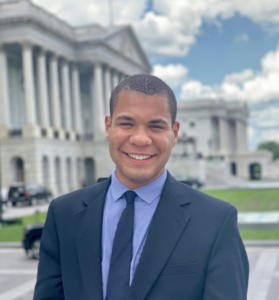2023-2024 Sessions
All sessions are two (2) hours in length, and will be from:
11:00 a.m.-1:00 p.m. CT
12:00 p.m.-2:00 p.m. ET
Session 1: November 15, 2023
Session 2: January 31, 2024
Session 3: March, 2024: (Date TBD)
*SPECIAL NOTE to Arizona School Districts ONLY*
There are changes between standard time and daylight saving time:
11/15/2023: 10:00 a.m.-12:00 p.m. MT
1/31/2024: 10:00 a.m.-12:00 p.m. MT
5/2024: 9:00 a.m.-11:00 a.m. PT
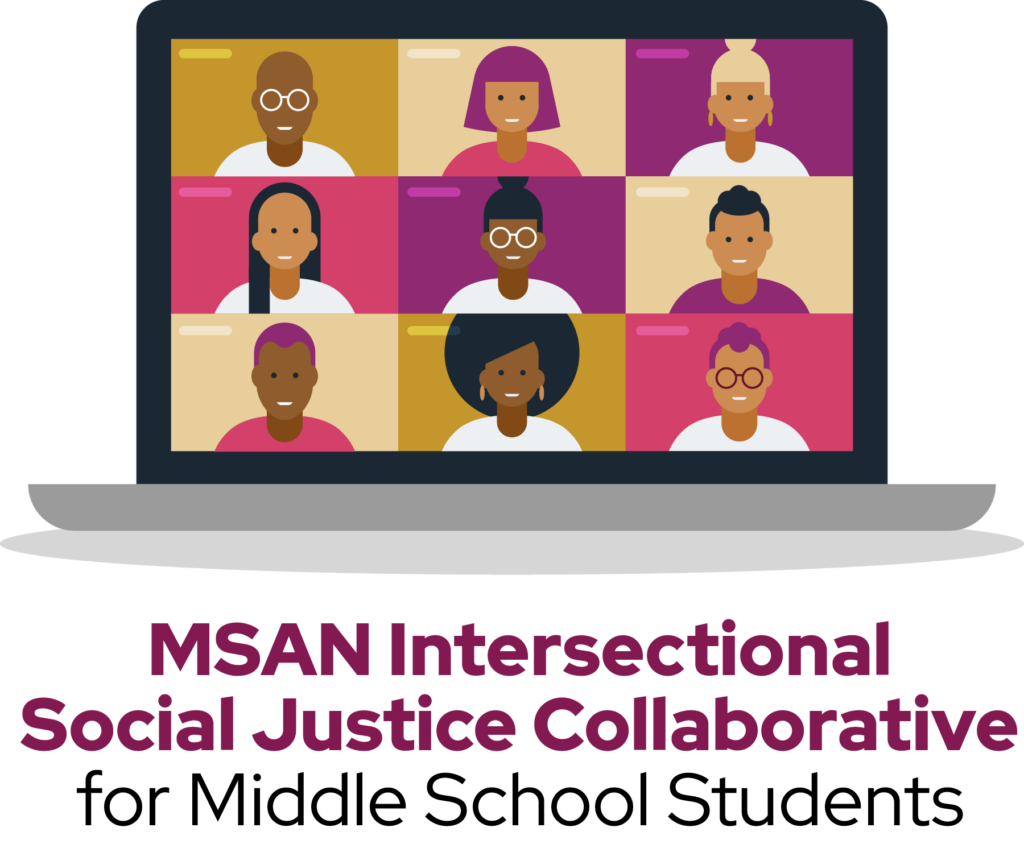
To register, please contact Connie Showalter at connie.showalter@wisc.edu
January 31, 2024 Session
Topic: Examining how labels, assumptions and stereotypes affect our identity.Objectives: Participants will explore how their identity is a combination of who they say they are, who others say they are and who they hope to be in the future.
Required Pre-Conference Materials
- Journal Prompt: Has someone ever made an assumption about you because of some aspect of your identity or because of a group that you belong to? Was it a positive assumption or negative one? How did you find out about the assumption? How did you respond?
-
Pre-work Instructions: Please spend some time reflecting on the journal prompt and writing your responses. Bring responses to the session with you!
Session Resources
Recorded Video
Previous Sessions
Objectives: Students will explore the significance that our names hold and how they shape our experiences throughout our lives. They will come to understand the impact our names have on our many social identities and social interactions.
- How did your name come to be?
- When you first see or hear a name of another person, what is your first thought?
- Does your provided name no longer serve who you are as a person? How did you come to that realization?
- How can we foster relationships and belonging just exploring our names?
Required Pre-Conference Materials
- Advisors: Please arrange a time to connect with your MSAN scholars, in-person or in a virtual space before participating in the first ISJC session.
- Work through the “Pride Name Acrostic” activity with your scholars. Some things to consider as you do this activity:
- Students should use the name that most associate with every day (i.e. students can use their middle name).
- Take this as an opportunity for students to get creative! Allow them to design their acrostic as a small poster that they can display in a shared physical (hanging on the wall) or virtual (digital gallery) space.
- Lastly, as students share out, you can engage them in deeper connection about the pride they have within their names. Feel free to take notes of student’s responses.
- What commonalities do we have within our names?
- How do we think names come to be? Do we think it is the same for all individuals?
Recorded Video
MSAN Intersectional Social Justice Collaborative for High School and Middle School Students
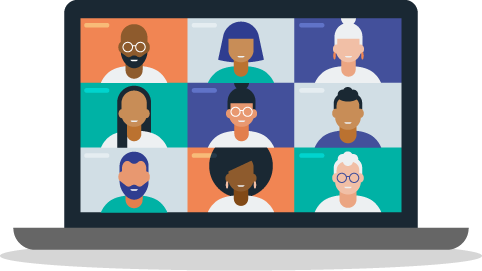
Agenda
- Welcome Back and Overview
- Equity Action Plan Presentations/Poster Fair
- Evaluation
Please review the following directions and share with your students before the event.
- Students will also learn:
- How language defines us so it matters. Consider the word “minority.”
- How fear, individualism, perfectionism, sense of urgency, progress understood as “bigger, better, more”, and other White supremacy characteristics get in our way of being fully human.
- How schools, as an extension and expression of our culture, perpetuate White supremacy culture.
- How we can choose appreciation over perfectionism, collectivism over individualism, and collaboration over competition.
Agenda
- Welcome and Overview of Session (including Objectives, Land Acknowledgement & Getting Centered, Agreements for Virtual Collaboration)
- Opening Poem by MSAN ISJC Scholars
- Our lives are shaped and defined by the language we use. Language matters.
- Examine the word “minority”
- Breakout Room: Individualism, Competition, and Perfection
- Break
- Keynote Speaker, Dr. David Stovall and Q&A
- Reminder of ISJC Equity Action Plans for April 26 Poster Fair
- Breakout room to discuss MSAN Name Change and Action Plans
- MSAN Name Change Survey
Required Pre-Session Instructions
- Read this article. What are other words in our language that carry power to minimize people?
- Look at this image. What do you think, feel, believe about it?
Keynote Speaker: Dr. David Stovall
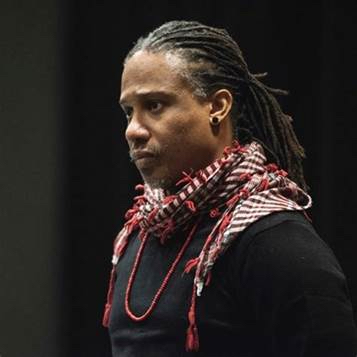 David Stovall, Ph.D. is Professor of African-American Studies and Criminology, Law & Justice at the University of Illinois at Chicago (UIC). His scholarship investigates three areas 1) Critical Race Theory, 2) the relationship between housing and education, and 3) the intersection of race, place and school. In the attempt to bring theory to action, he works with community organizations and schools to develop curriculum that address issues of equity and justice. His work led him to become a member of the design team for the Greater Lawndale/Little Village School for Social Justice (SOJO), which opened in the Fall of 2005. Furthering his work with communities, students, and teachers, his work manifests itself in his involvement with the Peoples Education Movement, a collection of classroom teachers, community members, students and university professors in Chicago, Los Angeles and the San Francisco Bay Area who engage in collaborative community projects centered in creating relevant curriculum. In addition to his duties and responsibilities as a professor at UIC, he also served as a volunteer social studies teacher at the Greater Lawndale/Little Village School for Social Justice from 2005-2018.
David Stovall, Ph.D. is Professor of African-American Studies and Criminology, Law & Justice at the University of Illinois at Chicago (UIC). His scholarship investigates three areas 1) Critical Race Theory, 2) the relationship between housing and education, and 3) the intersection of race, place and school. In the attempt to bring theory to action, he works with community organizations and schools to develop curriculum that address issues of equity and justice. His work led him to become a member of the design team for the Greater Lawndale/Little Village School for Social Justice (SOJO), which opened in the Fall of 2005. Furthering his work with communities, students, and teachers, his work manifests itself in his involvement with the Peoples Education Movement, a collection of classroom teachers, community members, students and university professors in Chicago, Los Angeles and the San Francisco Bay Area who engage in collaborative community projects centered in creating relevant curriculum. In addition to his duties and responsibilities as a professor at UIC, he also served as a volunteer social studies teacher at the Greater Lawndale/Little Village School for Social Justice from 2005-2018.
- Students will also learn:
- Black joy
- Criticality (how to raise one’s awareness to interrogate the status quo and unjust power dynamics)
- Our creativity and innovation can be our most important characteristics for both self-care and care for the Earth
- What it means to care for ourselves by caring for others
- Whatever you choose to do in life, do it with anti-racist intersectional intentionality
- How athletes can use their sports as a platform to be anti-racist
- WIN (” the Will to Include Everyone Now”)
Agenda
- Welcome and Overview of Session (including Objectives, Land Acknowledgement & Getting Centered, Agreements for Virtual Collaboration, Opening Poem by MSAN ISJC Scholars)
- Introduction to today’s themes and guiding questions
- What does it mean to be self-aware and how do I celebrate myself in a healthy, balanced way? With so many negative messages directed against Black and Brown bodied people, how I take care of myself is an act of revolution.
- Journal & Share
- Prompts:
- What does it mean to be self-aware?
- How do I celebrate myself in a healthy and balanced way?
- Prompts:
- Black Joy
- Images in the media
- Ways we can practice healthy self-care
- Breakout Room
- Reflecting on all that we have explored so far together, what is on your mind/heart?
- What are you going to try tomorrow?
- Break
- Keynote Speaker, Dr. Vanessa De Guía
- Q & A with Keynote Speaker, Dr. Vanessa De Guía
- Explanation of ISJC Equity Action projects
- Breakout Room to work on Equity Action Projects
- Next Steps
Required Pre-Session Instructions
- Think about a song or poem or piece of writing that supports you in taking good care of yourself. What are the messages it sends?
- Spend a day bringing your awareness to the media (TV, social media, movies, music, etc.) that you are watching, participating in, listening to…reflect how the program/song/movie/etc. is portraying people who share your intersectional identities. Do you like how they are being portrayed? In what ways are they supportive to you?
- We continue to take into consideration the input and feedback you gave from session one. We will do our best to incorporate it into this session 4 and going forward.
- We express our gratitude to you in advance for being critical partners in these seven sessions.
- In particular, during breakout rooms, we rely on your leadership to ensure:
- Participants introduce themselves and share an identity point of their choosing.
- Each participant is allowed space to speak.
- You (or the group with your direction/leadership) choose 1-3 speakers to speak in the whole group post-breakout room discussion. Important Note: *Important Note: These speakers repeat their own sharing, rather than share someone else’s story.
Keynote Speaker Video
Keynote Speaker: Dr. Vanessa De Guía
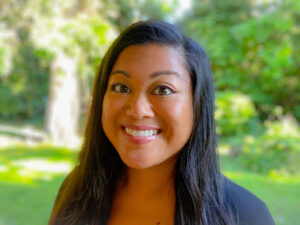 Dr. Vanessa DeGuia is the daughter of Filipinx Catholic immigrants born and raised on the traditional unceded homelands of the Council of the Three Fires: the Ojibwe, Odawa, and Potawatomi Nations. As Deputy Director of Enrich Chicago, she collaborates with a collective of 40 arts and philanthropic institutions working to end systemic racism in the arts. She has served in a variety of capacities within multicultural leadership initiatives in PK-12 education across the country over the last 20 years as a teacher, administrator, school leader coach, and consultant creating anti-racism frameworks, disrupting systemic inequity at its core, and mobilizing strategic plans into meaningful programs, opportunities, and institutional/individual actions with a focus on equity and belonging. Dr. DeGuia holds an Ed.D. in K-12 Educational leadership and Policy from Vanderbilt University, Ed.M. in School Leadership from Harvard University, M.Ed Curriculum and Instruction from National Louis University, and B.A. in English from University of Illinois at Chicago.
Dr. Vanessa DeGuia is the daughter of Filipinx Catholic immigrants born and raised on the traditional unceded homelands of the Council of the Three Fires: the Ojibwe, Odawa, and Potawatomi Nations. As Deputy Director of Enrich Chicago, she collaborates with a collective of 40 arts and philanthropic institutions working to end systemic racism in the arts. She has served in a variety of capacities within multicultural leadership initiatives in PK-12 education across the country over the last 20 years as a teacher, administrator, school leader coach, and consultant creating anti-racism frameworks, disrupting systemic inequity at its core, and mobilizing strategic plans into meaningful programs, opportunities, and institutional/individual actions with a focus on equity and belonging. Dr. DeGuia holds an Ed.D. in K-12 Educational leadership and Policy from Vanderbilt University, Ed.M. in School Leadership from Harvard University, M.Ed Curriculum and Instruction from National Louis University, and B.A. in English from University of Illinois at Chicago.
- Students will also learn:
- To differentiate between Justice (for all) versus “Just Us” (looking out for your own group only)
- The nature of human behavior
- How humans find their place of belonging
- The detrimental impact of the labels that we put on each other
- Often overlooked history of the Asian diaspora in the United States
- The myth of the model minority and challenging supposedly “positive” stereotypes
Agenda
- Welcome and Overview of Session (including Objectives, Land Acknowledgement & Getting Centered, Agreements for Virtual Collaboration, Opening Poem by MSAN ISJC Scholars)
- Introduction to today’s themes and guiding questions
- What does it mean to belong?
- Journal & Breakout Room
- Prompts:
- Think about someone you have labeled.
- Without naming that person, reflect on how this person might be looking for their place of belonging.
- What specifically could you do to help that person feel more included and be supportive of their unique intersecting identities?
- Where you are on the compass?
- What it was like to reflect on how you’ve labeled others?
- Share a piece of what you wrote with your breakout roommates.
- Does anyone feel compelled to try to act on what you wrote starting tomorrow?
- Prompts:
- Break
- Keynote Speaker, Dr. OiYan Poon
- Q & A with Keynote Speaker, Dr. OiYan Poon
- Explanation of ISJC Equity Action projects
- Breakout Room
- Prompts:
- Introduce yourselves.
- Journal alone for five minutes: What are the most significant issues or challenges impacting students of color in your school? Share what you’ve journaled.
- Ask each other open-ended questions about these challenges/issues. You are not trying to solve the problem but become crystal clear about the problem you are trying to solve.
- Write down one focusing question that captures your area of interest that you can share with the group. You might
- Prompts:
- Next Steps
Required Pre-Session Instructions
Students have two options for the pre-session activity. IF they have time they can watch and listen to both. If not they can choose according to their time constraints (see time in parentheses).- Video: Racial Choices: Justice or “Just Us” (18:04)
- Podcast: Be Antiracist w/Ibram X Kendi Black & Asian American Solidarity: Exchanging Ideas, Sharing History(49 min)
- We continue to take into consideration the input and feedback you gave from session one. We will do our best to incorporate it into this session and going forward.
- We express our gratitude to you in advance for being critical partners in these seven sessions.
- In particular, during breakout rooms, we rely on your leadership to ensure:
- Participants introduce themselves and share an identity point of their choosing.
- Each participant is allowed space to speak.
- You (or the group with your direction/leadership) choose 1-3 speakers to speak in the whole group post-breakout room discussion. Important Note: *Important Note: These speakers repeat their own sharing, rather than share someone else’s story.
Keynote Speaker Video
Keynote Speaker: Dr. OiYan Poon
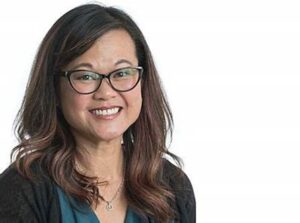 Dr. OiYan Poon is a mom of a Chicago Public School student, an education researcher, and an advocate for racial justice and equity. Her research focuses on the racial politics of Asian Americans, affirmative action, and admissions systems and practices. She is a co-author of an amicus brief submitted to the U.S. Supreme Court on behalf of over 1,240 social scientists in support of diversity and race-conscious admissions in SFFA v. Harvard, on which the Court will likely issue a ruling in spring 2023. In 2024, Beacon Books will publish her book, Asian American is Not a Color: A Love Letter to My Daughter. In it, she explores how Asian Americans are shaping the future of race relations through debates over affirmative action, using personal narrative and interviews of Asian Americans across the country. She earned a Ph.D. in race and ethnic studies in education and a certificate in Asian American Studies at UCLA. Fun fact: Dr. Poon has resided in four U.S. continental time zones. You can visit her website at: https://www.oiyanpoon.com/
Dr. OiYan Poon is a mom of a Chicago Public School student, an education researcher, and an advocate for racial justice and equity. Her research focuses on the racial politics of Asian Americans, affirmative action, and admissions systems and practices. She is a co-author of an amicus brief submitted to the U.S. Supreme Court on behalf of over 1,240 social scientists in support of diversity and race-conscious admissions in SFFA v. Harvard, on which the Court will likely issue a ruling in spring 2023. In 2024, Beacon Books will publish her book, Asian American is Not a Color: A Love Letter to My Daughter. In it, she explores how Asian Americans are shaping the future of race relations through debates over affirmative action, using personal narrative and interviews of Asian Americans across the country. She earned a Ph.D. in race and ethnic studies in education and a certificate in Asian American Studies at UCLA. Fun fact: Dr. Poon has resided in four U.S. continental time zones. You can visit her website at: https://www.oiyanpoon.com/- Students will also learn:
- How youth can collectively make a powerful and positive impact on the Earth through conscientious and intentional choices.
- About youth leaders in the environmental justice movement.
- Indigenous versus Western worldviews.
- How materialism creates a separation between us and our Earth.
- How racism and maltreatment of our Earth are connected.
- How indigenous wisdom and technology can mutually support the restoration of Earth’s ecosystems and address climate change.
- How youth can collectively make a powerful and positive impact on the Earth through conscientious and intentional choices.
Agenda
- Welcome and Overview of Session (including Objectives, Land Acknowledgement & Getting Centered, Agreements for Virtual Collaboration, Opening Poem)
- Introduction to today’s themes and guiding questions
- Young Indigenous people speak out (video)
- Sacredness of Land Acknowledgements
- Break
- Keynote Speaker, Calvin Terrell
- Q & A with Keynote Speaker, Calvin Terrell
- Breakout Room
- Prompts:
- What did you discover & learn from Calvin Terrell?
- What ideas do you have for your social action project?
- What challenges/obstacles do you anticipate?
- Journal alone for 5 minutes.
- Share what you journaled.
- Ask each other open-ended questions to begin to get some direction on what you MOST might want to focus on.
- Write down one focusing question that captures your area of interest that you can share with the group. You might start with: “What would be possible if we could…?”
- Choose three speakers to share in large group.
- Prompts:
- ISJC Poster Fair – Context and more details about it
- Next Steps
Required Pre-Session Instructions
- Please take some time to reflect on what your relationship is with our Mother Earth and all the other species who inhabit and share our planet.
- What do you know about Fridays for Future? Have you participated in one or more of them?
- What do you know about the UN Biodiversity Conference (COP 15) that started on December 7, 2022?
- We continue to take into consideration the input and feedback you gave from session one. We will do our best to incorporate it into this future sessions going forward.
- We express our gratitude to you in advance for being critical partners in these seven sessions.
- In particular, during breakout rooms, we rely on your leadership to ensure:
- Participants introduce themselves and share an identity point of their choosing
- Each participant is allowed space to speak
- You (or the group with your direction/leadership) choose 1-3 speakers to speak in the whole group post-breakout room discussion. Important Note: These speakers repeat their own sharing, rather than share someone else’s story.
- We are looking for your original poems and/or poems that inspire you for use in sessions 3-7.
- As we start each session, we will recite a poem to set the tone and space for all of us to be brave, to be vulnerable, to be open, to learn and grow together more deeply into the themes of the day.
- If you have a poem (original or from another poet), email us:
- the poem and full name of author
- Let us know for which session it is (3-7)
- If you would like to recite the poem yourself (or if you want us to recite it).
- Please email these poems to: Chris@FullCircleLeadership.org and Corrie@Corriellc.com
Keynote Speaker Video
Keynote Speaker: Calvin Terrell
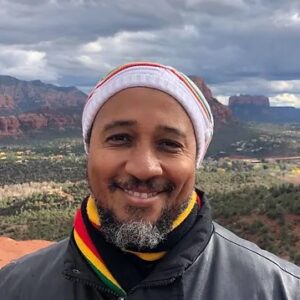 Calvin Terrell transforms pain into power and haunts into healing. Surviving violence, losing loved ones to addictions, murder, white supremacy, and misogyny, as well as owning his own prejudices and role in oppression, compels Calvin’s service. Calvin is founder/director of Social Centric Institute, a non-profit he built to educate anyone and everyone to be healers of historical trauma around racial intersections, class, religion, gender, and environmental disruption. For more than 25 years, Calvin has engaged every demographic throughout the US in historical trauma healing processes. His approaches draw from many technologies that are colonial, decolonized, and indigenous. See more at https://www.calvinterrell.com/
Calvin Terrell transforms pain into power and haunts into healing. Surviving violence, losing loved ones to addictions, murder, white supremacy, and misogyny, as well as owning his own prejudices and role in oppression, compels Calvin’s service. Calvin is founder/director of Social Centric Institute, a non-profit he built to educate anyone and everyone to be healers of historical trauma around racial intersections, class, religion, gender, and environmental disruption. For more than 25 years, Calvin has engaged every demographic throughout the US in historical trauma healing processes. His approaches draw from many technologies that are colonial, decolonized, and indigenous. See more at https://www.calvinterrell.com/
Action Plan Information
Topic: Exploring My Sphere of Influence: How does what I believe translate into my daily life…do my actions and behaviors match? I’m just a teenager; can I really make a difference?
Main Objective: Students will be able to gain tools that will help them interrogate and act on their beliefs by seeing examples of youth activists.
- How to take your dreams and turn them into a career.
- What it is like to work in politics.
- The role of public policy and advocacy to address local community concerns.
- What it means to be civically engaged.
- The importance of voting, elections, building connections, coalitions and developing relationships with community leaders.
Agenda
- Welcome and Overview of Session (including Objectives, Land Acknowledgement & Getting Centered, Agreements for Virtual Collaboration, Opening Poem)
- Introduction of idea of Activism- African American Artist Nick Cave
- Introduction of Social Justice Action Projects
- Journal
- Prompts:
- What do you think you might like to focus on for your social action project?
- Brainstorm with your breakout partners.
- This breakout room is purely to think of ideas.
- You DON’T have to decide on a project. Just generate ideas
- Choose 3 speakers to share in large group
- Prompts:
- Break
- Keynote Speakers/Panelists
- Q & A with Keynote Speakers/Panelists
- Breakout Room #1
- Prompts:
- What does activism look like today for you?
- What are the issues impacting your community?
- How will you engage civically?
- Prompts:
- ISJC Poster Fair – Introduction
- Breakout Room #2 – Brainstorm about projects
- Next Steps
Required Pre-Session Instructions
- Do you know how you and your community will be impacted by the upcoming November 7 elections?
- What are the most important issues to you and your community?
- How are you engaging with the upcoming mid-term elections?
- Have you found ways to volunteer for issues or candidates and/or to get out the vote?
Special Instructions to MSAN Advisors:
- We have taken into consideration the input and feedback you gave from session one. We will do our best to incorporate it into this session 2 and going forward.
- We express our gratitude to you in advance for being critical partners in these 7 sessions.
- In particular, during breakout rooms, we rely on your leadership to ensure:
- Participants introduce themselves and share an identity point of their choosing
- Each participant is allowed space to speak
- You (or the group with your direction/leadership) choose 1-3 speakers to speak in the whole group post-breakout room discussion. Important Note: These speakers repeat their own sharing rather than share someone else’s story.
Special Invitation to MSAN Scholars: We are looking for your original poems and/or poems that inspire you for use in sessions 3-7.
- We are looking for your original poems and/or poems that inspire you for use in sessions 3-7.
- As we start each session, we will recite a poem to set the tone and space for all of us to be brave, to be vulnerable, to be open, to learn and grown together more deeply into the themes of the day.
- If you have a poem (original or from another poet), email us:
- The poem and full name of the author.
- Let us know for which session (3-7) you would like to share it.
- If you would like to recite the poem yourself or if you want us to recite it.
- Please email these poems to: Chris@FullCircleLeadership.org and Corrie@Corriellc.com
For this second session, we have chosen to recite this:
Child of the Americas by Aurora Levins Morales
I am a child of the Americas,
a light-skinned mestiza of the Caribbean,
a child of many diaspora, born into this continent at a crossroads.
I am a U.S. Puerto Rican Jew,
a product of the ghettos of New York I have never known.
An immigrant and the daughter and granddaughter of immigrants.
I speak English with passion: it’s the tongue of my consciousness,
a flashing knife blade of crystal, my tool, my craft.
I am Caribeña, island grown. Spanish is my flesh,
Ripples from my tongue, lodges in my hips:
the language of garlic and mangoes,
the singing of poetry, the flying gestures of my hands.
I am of Latinoamerica, rooted in the history of my continent:
I speak from that body.
I am not African. Africa is in me, but I cannot return.
I am not taína. Taíno is in me, but there is no way back.
I am not European. Europe lives in me, but I have no home there.
I am new. History made me. My first language was spanglish.
I was born at the crossroads and I am whole.
Keynote Speakers Video
Keynote Panelists
Alex Moore, Communications Director for Congresswoman Jan Schakowsky (IL-09)
Alex currently serves as Communications Director for Congresswoman Jan Schakowsky (IL-09). In this role, Alex is responsible for managing all aspects of the Congresswoman’s communications, including writing speeches and press releases, creating social media content, and maintaining relationships with national and local reporters. Prior to his work on Capitol Hill, Alex served as a Public Affairs Associate at Kivvit, a strategic communications firm, a politics reporter for Medill News Service, and a production intern for NBC’s Today show.
Alex graduated from Northwestern University in 2021 where he double majored in Journalism and Political Science. An Evanston, IL native, Alex made it his mission at Northwestern to better the relationship between the university and the greater Evanston community. During his freshman year, he helped co-found Northwestern’s Community Engagement Coalition, a coalition that promotes undergraduate leadership at Northwestern by convening and supporting student-led organizations committed to local civic engagement and community service.
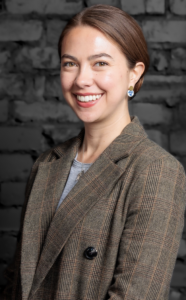 Sammy Rasin, Digital communications director at the Wisconsin assembly democratic campaign committee
Sammy Rasin, Digital communications director at the Wisconsin assembly democratic campaign committee
After graduating from Barnard College in 2018 with a degree in economics, Sammy worked on various political campaigns as an organizer, including Max Rose in Staten Island, Pete Buttigieg in Iowa and Joe Biden in Wisconsin. After the 2020 election, she enrolled in a Masters program at Georgetown University, where she is studying how political campaigns use communications technology. She is currently taking a semester off to help elect Democrats to the State Legislature as the digital communications director for the Wisconsin Assembly Democratic Campaign Committee.
Topic: Exploring My Beliefs as an Intersectional Being: Who am I and what do I believe?
Main Objective: Students will be able to reflect on their life experiences based on their intersecting identities. Students will also learn:
- The Why behind our ISJC title and each of its components*(see italics below)
- What a land acknowledgement is and its importance.
- How to use the Compass tool from Courageous Conversations when speaking about race and identity.
- The value of shared community agreements.
- The concept of Intersectionality and the element of power relative to identities.
- The major social identity points of a person living in the United States.
* ISJC defined:
- Intersectional – adj. relating to different social categories such as race, class and gender and the way that these can combine to result in additional disadvantage or discrimination
- Social – adj. relating to society or its organization
- Justice – noun. Just behavior or treatment
- Social Justice – noun. justice in terms of the distribution of wealth, opportunities, and privileges within a society
- Collaborative – adj. produced or conducted by two or more parties working together
Agenda
- Welcome and Overview
- Meet the new MSAN Interim Executive Director, Latoya Holiday
- Land Acknowledgement & Getting Centered
- Agreements for Virtual Collaboration
- ISJC-Intersectional Social Justice Collaborative-what do each of these words mean?
- Keynote and Q&A by Sofia Garcia, former MSAN scholar and current graduate student at the University of Wisconsin-Madison
- Break
- Breakout Room #1
- Prompts:
- Personal Identity Circles
- Introduce yourselves by sharing one of the categories listed that’s most important to you.
- If you have more time, do another round with another category.
- Choose 1-3 speakers for the whole group discussion after the breakout session.
- Personal Identity Circles
- Prompts:
- Breakout Room #2
- Social Identity Circles
- Discuss the difference between social & personal identities.
- How do your identities inform your beliefs?
- Choose 1-3 speakers for the whole group discussion after the breakout session.
- Social Identity Circles
- Identity Discussion
- Next Steps
Required Pre-Session Instructions:
- Advisors, please have copies of each wheel printed for each participant.
- Personal Identity Wheel, IGR, U of M (Program on Intergroup Relations & Dialogue), University of Michigan
- Social Identity Wheel IGR, U of M (Program on Intergroup Relations & Dialogue), University of Michigan
Special Instructions to MSAN Advisors:
- We express our gratitude to you in advance for being critical partners in these seven sessions.
- In particular, during breakout rooms, we rely on your leadership to ensure:
- Participants introduce themselves and share an identity point of their choosing
- Each participant is allowed space to speak
- You (or the group with your direction/leadership) choose 1-3 speakers to speak in the whole group post-breakout room discussion. Important Note: These speakers repeat their own sharing, rather than share someone else’s story.
Special Invitation to MSAN Scholars: We are looking for your original poems and/or poems that inspire you for use in sessions 3-7.
- As we start each session, we will recite a poem to set the tone and space for all of us to be brave, to be vulnerable, to be open, to learn and grow together more deeply into the themes of the day.
- If you have a poem (original or from another poet), email us:
- The poem and full name of the author.
- Let us know for which session (3-7) you would like to share it.
- If you would like to recite the poem yourself or if you want us to recite it.
- Please email these poems to: Chris@FullCircleLeadership.org and Corrie@Corriellc.com
For the first session, we have chosen to recite this:
In La’kech = I am you & You are me
Mayan Philosophy
Tú eres mi otro yo.
You are my other me.
Si te hago daño a ti,
If I do harm to you,
Me hago daño a mi mismo.
I do harm to myself.
Si te amo y respeto,
If I love and respect you,
Me amo y respeto yo.
I love and respect myself.
Guest Speaker: Sofia Garcia Garbuno is a former MSAN scholar. Sofia is a graduate student at the University of Wisconsin.
Agenda
- Welcome Back & Overview
- Equity Action Plan Presentations/Poster Fair
- Evaluation
Please review the following directions in preparation for our event: https://docs.google.com/document/d/1tm-mwIX6bO33udlfhbCN9tSx709JFRuimQJJOwTRxwI/edit
Topic: Exploring Collectivism & Collaboration
Main Objective: Students will be able to understand the importance of collectivism and collaboration, gain an understanding and appreciation of different leadership styles and learn to identify their own leadership style and how to effectively contribute to a collective.
Agenda
- Collectivism & Collaboration Brainstorm
- (Depending on if scholars bring something to share: Open Mic)
- Journal about examples of collaboration in nature
- Breakout rooms:
- Share your examples of what collaboration looks like in nature.
- Explore what we as humans can learn/draw from these examples
- Breakout Room highlights
- Video: Excerpt Emergent Strategy Adrienne Maree Brown
- Asian American Leadership in face of Anti-Asian Racism
- Examples of Collectivist vs Individualist Cultures
- Examples drawn by Zaretta Hammond
- Group Grades – Democratic Classrooms
- Guest Speaker: ETHS Science Teacher, Steven Speight
- Breakout Rooms by School/District to work on Social Justice Action Projects
Topic: Exploring body positivity & health–mentally, emotionally, spiritually & physically: How do I celebrate myself in a healthy, balanced way?
Main Objective: Students will be able to investigate what it means to strive for balance in our lives.
Agenda
- Welcome back
- Exploring Body Positivity & Health: Mentally, Emotionally, Spiritually & Physically
- Putting it all together
- The Story Of Stuff
- Breakout rooms for 15 minutes (will be in rooms with people from other schools and districts)
- Break
- Exploring our creativity as a spark for change
- Equity Action Plan check-in
- Breakout rooms for 25 minutes (will be in a room with others from your district and school level, middle or high school)
- Closing Circle
Required Pre-Session Instructions
Please watch and reflect on the video below in preparation for our February 9th session. Can Art Amend History? Titus Kaphar
Topic: Exploring Mother Earth, my environment & materialism: What’s the story of the land I’m living on?
Main Objective: Students will learn how an Indigenous culture, the Gwich’in nation, relates to and with the web of life, and learn to explore their own personal relationship to Mother Earth.
- Students will also learn:
- Indigenous versus Western worldviews.
- How an Indigenous nation is connected to the natural environment and to animals.
- How racism and maltreatment of our Earth are connected.
- The history of forced boarding schools for Indigenous young people in the U.S. and Canada.
- How indigenous wisdom and technology can mutually support the restoration of Earth’s ecosystems and address climate change.
- How youth can make a powerful and positive impact on the Earth through conscientious and intentional choices.
Agenda
- Welcome back & overview of today’s theme: What is the story of the land you are on
- Getting centered & land acknowledgment
- Virtual collaboration agreements
- Break
- Introduction of Social Justice Action Plans, MSAN Executive Director, Madeline Hafner
- Breakout room Brainstorm: Social Justice Action Plans
- Whole group share out of highlights from breakout rooms
- Appreciation & Wrap Up
Required Pre-Session Instructions
Please choose one of these videos and/or listen to oral stories by Gwich’in elders. Of course, you are welcome to watch and/or listen to as many as you like. Then, reflect on the questions below before attending our January 12 session. Bring an artifact, an object that speaks to your roots, an identity that is significant to you or that demonstrates your connection to Mother Earth. It can be anything you choose. There’s no right or wrong answer.
- Indigenous Leaders Stand With Gwich’in to Protect Ancestral Lands – Videos – NowThis (3 minutes) Highlights the struggle to protect the sacred land of the Gwich’in and the birthing grounds of the Porcupine Caribou herd.
- Dana Tizya-Tramm speaks at the Global Climate Action Summit (2 minutes) Chief Dana Tizya-Tramm speaks about the urgent threat to the survival of his people.
- Patagonia’s “The Refuge” (15 minutes) Provides powerful first hand testimonials from Gwich’in people.
- “Gwich’in Women Speak” (19 min) Profiles Gwich’in women’s voices. Film made by Japanese filmmaker/activist, Miho Aida, who biked across the USA talking to groups to inspire them to protect the Arctic Refuge.
- Neets’aii Gwich’in — Songs & Stories Of The Arctic Neets’aii Gwich’in: A Message To The World (3 minutes – 60 minutes depending on how many stories you choose to listen to) Oral Stories of Gwich’in elders.
- The story making this album of stories
Reflection Questions
- What is the story of the land you are living on?
- What is your connection to our Mother Earth?
- In what ways have you and the people you love lost your connection to the land and to the web of life beyond the human world?
- In what ways do you and the people you love connect to the land and web of life beyond the human created world?
Topic: Exploring Community Organizing, Housing & Gentrification: Who are the people in your neighborhood/community?
Main Objective: Students will be able to investigate their community and what it means to be civically engaged.
- Students will also learn:
- How to identify important community leaders for their action plan/social justice project.
- How to build connections & relationships with those community leaders.
- The basic foundations of community organizing.
Agenda
- Welcome back & overview
- Getting centered & land acknowledgment
- Community agreements for virtual collaboration
- Breakout Room Conversation: Identifying possible focus area(s) and school/community allies for equity action plan/social justice project.
- Keynote featuring Dr. Dave Stovall, Professor, University of Illinois Chicago
- Q & A with Dr. Dave Stovall
- Breakout Room Conversations: Community/neighborhood asset mapping
Required Pre-Session Instructions
- Think about: What identities do you hold & what resources are available to you based on those identities in your own community/neighborhood?
- Choose and watch a video:
- Why I turned Chicago’s Abandoned Homes into Art (13:22)
An artist’s take on how we can re-imagine what our neighborhoods are worth—not by standards others set for us, but rather by our own standards.
- Why I turned Chicago’s Abandoned Homes into Art (13:22)
- GI Bill, Race power of an Illusion (6:04)
Our government gave unfair advantage to white men and their families to purchase homes and build wealth that the government did not give to families of color.
- GI Bill, Race power of an Illusion (6:04)
- Disturbing History of the Suburbs (6:19)
Uncover the truth about how neighborhoods, and suburbs did not become segregated by accident.
- Disturbing History of the Suburbs (6:19)
- How the world lives by income (11:42)
See how different people live around the world according to how much money the family has and what is fascinating similarities
- How the world lives by income (11:42)
- Folded Map project
If you took the map of the city of Chicago and folded it in half, and chose a house with the same address on the North side and the South side and got those folx to meet and talk, what might you learn?
- Folded Map project
Keynote Speaker
David Stovall, Ph.D. is Professor of African-American Studies and Criminology, Law & Justice at the University of Illinois at Chicago (UIC). His scholarship investigates three areas 1) Critical Race Theory, 2) the relationship between housing and education, and 3) the intersection of race, place and school. In the attempt to bring theory to action, he works with community organizations and schools to develop curriculum that address issues of equity and justice. His work led him to become a member of the design team for the Greater Lawndale/Little Village School for Social Justice (SOJO), which opened in the Fall of 2005. Furthering his work with communities, students, and teachers, his work manifests itself in his involvement with the Peoples Education Movement, a collection of classroom teachers, community members, students and university professors in Chicago, Los Angeles and the San Francisco Bay Area who engage in collaborative community projects centered in creating relevant curriculum. In addition to his duties and responsibilities as a professor at UIC, he also served as a volunteer social studies teacher at the Greater Lawndale/Little Village School for Social Justice from 2005-2018.
- Students will also learn:
- The fundamentals of Abolitionist teaching and education
- The five questions to ask when starting a community project
- What it means to be a co-conspirator
- What “mattering” means
- Freedom Dreaming and Black joy
Agenda
- Welcome Back & Overview
- Getting Centered
- Agreements for virtual collaboration
- Keynote featuring Dr. Bettina Love
- Break
- Q & A
- Grappling with what it means to be an abolitionist & what you’d like to change in Breakout Rooms
Required Pre-Session Instructions
Please take a few minutes to view the video (below) and reflect on these five questions before attending our November 17 session: During a webinar on Abolitionist Teaching and the Future of our Schools presented this past June, racial justice scholar and co-founder of the Abolitionist Teacher Network, Dr. Bettina Love shared five questions we can ask ourselves to think more deeply and differently about the equity work we do. These key questions come from a book by community organizer Charlene A Caruthers, Unapologetic: A Black, Queer, and Feminist Mandate for Radical Movements.- Who am I? [Have you examined who you are? Do you know who you are?]
- Who are my people?[Who are my people in this movement/work? Do you have the people around you to make the strides that you want to make in your school? Who is your team?]
- What do we want?[Not what we don’t want.]
- What are we building?
- Can we win?
Additional Resources Regarding the Real Story of Thanksgiving
This is not required, but we invite you to explore and learn the real story of Thanksgiving. We suggest these three short group activities:- Discuss and share what you already know about the story of Thanksgiving.
- Further prompts for Advisors to students:
- Where did you learn what you know?
- Who benefits from people not knowing the story from an Indigenous perspective?
- What is lost when we erase people’s history?
- What can you do now to heal the past?
- What can you do to reconnect peoples and cultures to seek a just and healthy shared future?
- Further prompts for Advisors to students:
- Read and watch a short article and two minute video from Teen Vogue
- Look at and discuss the image by Wendy Red Star below.
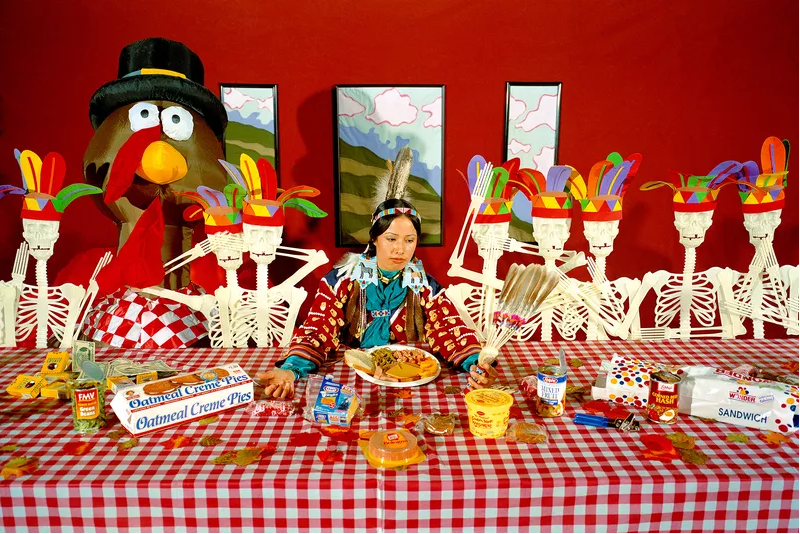 Thanksgiving perspectives Wendy Red Star – The Last Thanks
Prompts for Advisors to group:
Thanksgiving perspectives Wendy Red Star – The Last Thanks
Prompts for Advisors to group:
- The history of anything often comes with multiple perspectives. The history of the United States is often complicated yet commonly told from a singular view. As you look at this picture, what do you notice?
- What does your Eye see?
- What does your Mind see?
- Notice the symbolism in the piece including the compositional reference to The Last Supper
- Students will also learn:
- What a land acknowledgement is and its importance.
- How to use the Compass tool from Courageous Conversations when speaking about race and identity.
- The value of shared community agreements.
- The concept of Intersectionality and the element of power relative to identities.
- What the upcoming ISJC Action Project looks like via a panel of MSAN graduates as they speak about their experiences and project(s).
Agenda
- Welcome and Overview
- Getting Centered
- Land Acknowledgement
- Agreements for Virtual Collaboration
- Written Reflection
- Breakout Rooms
- Prompts:
- Introduce yourselves with name, race, pronouns
- After watching/listening to Alex Monte’s story in the video & journaling about who you are & who people think you are based on what you look like, what’s on your mind?
- Prompts:
- Identity Activities
- Break
- Intersectionality and its Impact
- Breakout Rooms
- Prompts:
- What did it feel like to cross off pieces of yourself?
- Was there anything challenging/surprising?
- We are all so many things yet constantly reduced to 1-2 labels/identities by society. What are your thoughts on that reality?
- Prompts:
- Keynote Panel featuring Evanston Township High School alumni, Shades Project at Chute Middle School
- Project Exploration in your School Community
- Next Steps
Required Pre-Session Instructions
Please watch Evanston United Black Men Rally to Support Black Lives – Liana Wallace – spoken word (6:44) Students will need paper and a writing utensil for this session and future sessions.Agenda
- Welcome Back & Overview
- Social Justice Poster Fair – Equity Action Plans
- Keynote: Dr. David Stovall, Professor, University of Illinois Chicago
- Q & A with Dr. Stovall
- Wild Writing: Reflections on Learning
- Open Mic & Farewell
- Evaluation
Agenda
Exploring Collectivism & Collaboration
- Collectivism & Collaboration Brainstorm
- Journal about examples of collaboration in nature
- Breakout rooms:
- Share your examples of what collaboration looks like in nature.
- Explore what we as humans can learn/draw from these examples
- Breakout Room highlights
- Video: Excerpt Emergent Strategy Adrienne Maree Brown
- Examples of Collectivist vs Individualist Cultures
- Examples drawn by Zaretta Hammond
- Group Grades – Democratic Classrooms
- Panel: ETHS Science Teacher, Steven Speight & students
- My Role in Social Change Ecosystem Check-in, Deepa Iyer
- Explore the distinct leadership roles
- Share resources to sustain yourself: We saw important social activism last year. Here’s how to maintain it in 2021
- Breakout Rooms by School/District to work on Social Justice Action Projects
- Open Mic by the student participants of this MSAN ISJC!
Agenda
- Welcome back
- Exploring Body Positivity & Health: Mentally, Emotionally, Spiritually & Physically
- Putting it all together
- The Story Of Stuff
- Breakout rooms for 15 minutes (will be in rooms with people from other schools and districts)
- Break
- Exploring our creativity
- Blackout Poetry connected to Can we talk about college majors? N.A.H. Relando Tompkins Jones
- Social Justice Action Plan check-in
- Breakout rooms for 20-25 minutes (will be in a room with others from your district and school level, middle or high school)
- Closing Circle
Pre-Session Materials
Please watch and reflect on the video below in preparation for our March 10th session. Can Art Amend History? Titus Kaphar
Agenda
- Welcome back & overview of today’s theme: What is the story of the land you are on
- Getting centered & land acknowledgment
- Virtual collaboration agreements
- Video: Gwich’in Leaders’ Stand
- Keynote: Chief Dana Tizya-Tramm of the Vuntut Gwich’in people of Yukon, Canada
- Q & A with Chief Dana Tizya-Tramm
- Break
- Introduction of Social Justice Action Plans, MSAN Executive Director Madeline Hafner
- Breakout room Brainstorm: Social Justice Action Plans
- Whole group share out of highlights from breakout rooms
- Appreciation & Wrap Up

Meet our Keynote Speaker: Chief Dana Tizya-Tramm is the Chief of the Vuntut Gwich’in First Nation of Yukon, Canada. At 31, he is believed to be the youngest Chief the First Nation has ever had and was named Northerner of the Year by Up Here magazine. The Gwich’in First Nation people have lived along the migratory path of the Porcupine Caribou herd for 30,000 years. The herd’s migration transcends the national borders of Canada and the United States. Caribou can make up to 80% of Gwich’in people’s diet and intrinsically tied to their culture. This month is an extremely challenging time for the Gwich’in people: on January 6, 2021, the White House held a sale to lease to oil companies the rights to drill for oil in the Arctic National Wildlife Refuge in Alaska. This sacred land is precisely the birthing grounds for the Porcupine Caribou herd—the “place where life began” according to the Gwich’in. The Arctic National Wildlife Refuge is also the last preserved whole eco-system in North America. It is home to polar and grizzly bears and hundreds of other species of animals including birds which migrate between the Northern and Southern hemispheres—all of which would be threatened by oil drilling. Gwich’in leaders including Chief Dana Tizya-Tramm vehemently oppose oil drilling which would end their way of life and culture, threaten the survival of the Porcupine Caribou herd, and destroy one of the few remaining whole ecosystems in the world—a world already struggling with climate change catastrophes.
Keynote Address
Pre-Session Materials
Please choose one of these videos and/or listen to oral stories by Gwich’in elders. Of course, you are welcome to watch and/or listen to as many as you like. Then, reflect on the questions below before attending our February 3 session.
- https://nowthisnews.com/videos/news/indigenous-leaders-stand-with-gwichin-to-protect-ancestral-lands (3 minutes)
Highlights the struggle to protect the sacred land of the Gwich’in and the birthing grounds of the Porcupine Caribou herd - Dana Tizya-Tramm speaks at the Global Climate Action Summit (2 minutes)
Chief Dana Tizya-Tramm speaks about the urgent threat to the survival of his people. - Patagonia’s “The Refuge” (15 minutes) Provides powerful first hand testimonials from Gwich’in people.
- “Gwich’in Women Speak” (19 min) Profiles Gwich’in women’s voices. Film made by Japanese film maker/activist, Miho Aida, who biked across the USA talking to groups to inspire them to protect the Arctic Refuge.
 Neets’aii Gwich’in — Songs & Stories Of The Arctic Neets’aii Gwich’in: A Message To The World (3 minutes – 60 minutes depending on how many stories you choose to listen to)
Neets’aii Gwich’in — Songs & Stories Of The Arctic Neets’aii Gwich’in: A Message To The World (3 minutes – 60 minutes depending on how many stories you choose to listen to)
Oral Stories of Gwich’in elders- The story making this album of stories
Reflection Questions:
What is the story of the land you are living on?
What is your connection to our Mother Earth?
In what ways have you and the people you love lost your connection to the land and to the web of life beyond the human world?
In what ways do you and the people you love connect to the land and web of life beyond the human created world?
Agenda
- Welcome back & overview
- Getting Centered & land acknowledgment
- Agreements for virtual collaboration
- Artifact sharing circles in breakout rooms
- Keynote featuring Jahmal Cole, CEO & Founder of My Block My Hood My City
- Break
- Q & A with Jahmal Cole
- Neighborhood Asset Mapping in breakout rooms
- Exploring ideas for Social Just Action Plans in breakout rooms
Pre-Session Materials
What identities do you hold & what resources are available to you based on those identities in your own neighborhood? What identities don’t you hold and what resources are available to support people that hold those identities in your neighborhood? Think specifically about marginalized peoples.
Videos (Choose and watch one):
- Why I turned Chicago’s Abandoned Homes into Art (13:22)
An artist’s take on how we can re-imagine what our neighborhoods are worth—not by standards others set for us, but rather by our own standards.
- GI Bill, Race power of an Illusion (6:04)
Our government gave unfair advantage to white men and their families to purchase homes and build wealth that the government did not give to families of color.
- Disturbing History of the Suburbs (6:19)
Uncover the truth about how neighborhoods, and suburbs did not become segregated by accident.
- How the world lives by income (11:42)
See how different people live around the world according to how much money the family has and what is fascinating similarities - Folded Map project
If you took the map of the city of Chicago and folded it in half, and chose a house with the same address on the North side and the South side and got those folx to meet and talk, what might you learn?
Keynote Speaker
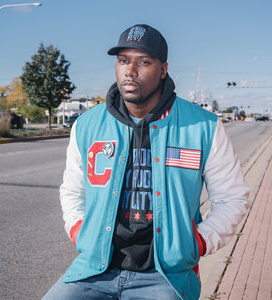
Jahmal Cole, CEO & Founder of My Hood My Block My City is a champion of social justice, Jahmal Cole’s mission is to build a more interconnected Chicago on the pillars of service and education. As the founder and CEO of the city’s fastest growing social impact organization, My Block My Hood My City, Jahmal is the creator of an exposure-based education program for teens and a network of volunteer initiatives that serve Chicago communities year-round. Read more about Jahmal Cole .
Agenda
- Welcome Back & Overview
- Getting Centered
- Agreements for virtual collaboration
- Artifact Sharing Circles in Breakout Rooms
- Keynote featuring Dr. Bettina Love
- Break
- Q & A
- Grappling with what it means to be an abolitionist & what you’d like to change in Breakout Rooms
Pre-Session Materials
Please take a few minutes to view this video and reflect on these five questions before attending our December 2 session: During a webinar on Abolitionist Teaching and the Future of our Schools presented this past June, racial justice scholar and co-founder of the Abolitionist Teacher Network, Dr. Bettina Love shared five questions we can ask ourselves to think more deeply and differently about the equity work we do. These key questions come from a book by community organizer Charlene A Caruthers, Unapologetic: A Black, Queer, and Feminist Mandate for Radical Movements.- Who am I? [Have you examined who you are? Do you know who you are?]
- Who are my people? [Who are my people in this movement/work? Do you have the people around you to make the strides that you want to make in your school? Who is your team?]
- What do we want? [Not what we don’t want.]
- What are we building?
- Can we win?
Agenda
- Welcome and Overview
- Getting Centered
- Land Acknowledgement
- Agreements for Virtual Collaboration
- Written Reflection
- Breakout Rooms
- Identity Activities
- Break
- Intersectionality and its Impact
- Keynote Panel featuring Evanston Township High School alumni, Shades Project at Chute Middle School
- Project Exploration in your School Community
- Introduction to Dr. Bettina Love
- Next Steps
Pre-Session Materials
Evanston United Black Men Rally to Support Black Lives – Liana Wallace – spoken word Students will need paper and a writing utensil.
Speakers
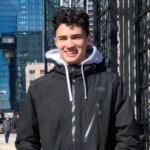
Nick Rosenfeld
Nick Rosenfeld (He/him/his) is a sophomore studying biology at Loyola University Chicago. He was born and raised in Evanston, Illinois. He is mixed North African & white, Muslim American, and a first generation college student.
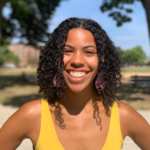
Liana Wallace
Liana Wallace is a 19 year old sophomore at Georgetown University majoring in International Business and Finance with a minor in Women & Gender studies. Although born outside of Chicago, as a little girl she spent four years living in Tokyo and Singapore. Liana is also a 2019 Coke Scholar, a Seattle-Limbe Sister City association Delegate who delivered reusable menstrual kits to women and girls in Cameroon, and a spoken word artist who performed for Congressman John Lewis.
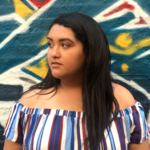
Sofia Garcia Garbuno
Sofia Garcia Garbuno (she/they) is a current third-year student at the University of Wisconsin-Madison majoring in Educational Studies with a certificate in Chicanx/Latinx Studies. Sofia is a 1st-generation college student with an interest in educational equity and the experience of BIPOC students throughout their youth. After graduating from the University of Wisconsin-Madison, Sofia plans to pursue their JD/PhD and continue their educational aspirations.
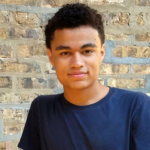
Quinn Hughes
Quinn Hughes is a senior at Evanston Township High School, where he is a fourth year board member of Students Organized Against Racism, a student-run group that seeks to resist the impacts of systemic racism by working with teachers and school administration. Quinn is also captain of the debate team, and a staff writer for the school newspaper. Outside of school he enjoys reading, running and listening to music. He attended the MSAN conference in 2017 and 2018.
Facilitators (2020-2023)
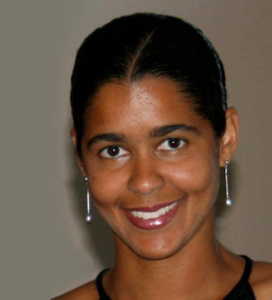
Corrie Wallace is a multilingual anti-oppression educator and consultant dedicated to building collaborative partnerships that enrich the lives of marginalized people through community outreach locally and internationally. She taught Spanish at ETHS (Evanston Township High School) and UWCSEA (United World College of South East Asia) as well as English at Kogai Shogako, a Japanese public school in Tokyo. Corrie is an Adjunct Lecturer at Northwestern University and was the founding director of the Niles Township Schools’ ELL (English Language Learner) Parent Center helping adults learn how to navigate U.S. schools and the township’s first Equity Director. Corrie was the Chicagoland Coordinator for the National SEED (Seeking Educational Equity and Diversity) Project and is a founding member of the Illinois Coalition of Educational Equity Leaders. Corrie was a member of the 3rd delegation of Seattle-Limbe’s Sister City Association which delivered sustainable feminine hygiene kits that enable girls in Cameroon, Africa to stay in school while on their periods, as well as teaching about reproductive health and African-American history. Corrie has a BA in Women’s Studies and Spanish from the University of Michigan and an MA in Educational Leadership from Western Michigan University. She loves to travel, read, and enjoy good food.
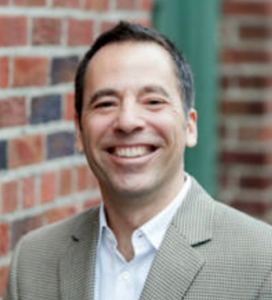 Christopher Fontana educates from a democratic leadership, anti-oppression, and environmental justice perspective. He serves as Founder/Executive Director of Full Circle Leadership Center leading professional development workshops for adults, K-12 teachers, business leaders and youth from around the U.S. and world. He taught Spanish & Global Leadership in public schools for 16 years including 8 years at MSAN School, Niles West High School. Christopher co-founded and ran Global Visionaries, a non-profit organization promoting bi-lateral solidarity and leadership between high school youth of Guatemala and the U.S. Prior to this MSAN Intersectional Social Justice Collaborative, he has co-organized with youth numerous events and conferences including YES, the youth-organized global Youth Environmental Summits, sponsored by the United Nations Environmental Program and the University of Peace in Costa Rica, which brought 600 high school students from 32 countries and 40 States together. He is a father of two genius children, as all children are geniuses.
Christopher Fontana educates from a democratic leadership, anti-oppression, and environmental justice perspective. He serves as Founder/Executive Director of Full Circle Leadership Center leading professional development workshops for adults, K-12 teachers, business leaders and youth from around the U.S. and world. He taught Spanish & Global Leadership in public schools for 16 years including 8 years at MSAN School, Niles West High School. Christopher co-founded and ran Global Visionaries, a non-profit organization promoting bi-lateral solidarity and leadership between high school youth of Guatemala and the U.S. Prior to this MSAN Intersectional Social Justice Collaborative, he has co-organized with youth numerous events and conferences including YES, the youth-organized global Youth Environmental Summits, sponsored by the United Nations Environmental Program and the University of Peace in Costa Rica, which brought 600 high school students from 32 countries and 40 States together. He is a father of two genius children, as all children are geniuses.
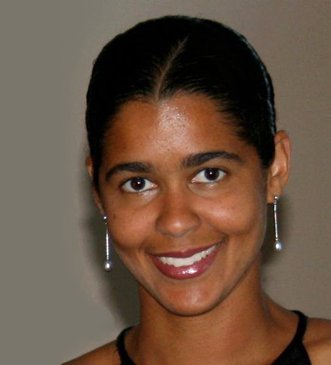
Corrie Wallace
Corrie Wallace is a multilingual anti-oppression educator and consultant dedicated to building collaborative partnerships that enrich the lives of marginalized people through community outreach locally and internationally. She taught Spanish at ETHS (Evanston Township High School) and UWCSEA (United World College of South East Asia) as well as English at Kogai Shogako, a Japanese public school in Tokyo. Corrie is an Adjunct Lecturer at Northwestern University and was the founding director of the Niles Township Schools’ ELL (English Language Learner) Parent Center helping adults learn how to navigate U.S. schools and the township’s first Equity Director. Corrie was the Chicagoland Coordinator for the National SEED (Seeking Educational Equity and Diversity) Project and is a founding member of the Illinois Coalition of Educational Equity Leaders. Corrie was a member of the 3rd delegation of Seattle-Limbe’s Sister City Association which delivered sustainable feminine hygiene kits that enable girls in Cameroon, Africa to stay in school while on their periods, as well as teaching about reproductive health and African-American history. Corrie has a BA in Women’s Studies and Spanish from the University of Michigan and an MA in Educational Leadership from Western Michigan University. She loves to travel, read, and enjoy good food.
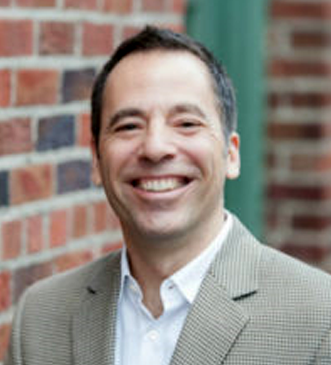
Christopher Fontana
Christopher Fontana educates from a democratic leadership, anti-oppression, and environmental justice perspective. He serves as Founder/Executive Director of Full Circle Leadership Center leading professional development workshops for adults, K-12 teachers, business leaders and youth from around the U.S. and world. He taught Spanish & Global Leadership in public schools for 16 years including 8 years at MSAN School, Niles West High School. Christopher co-founded and ran Global Visionaries, a non-profit organization promoting bi-lateral solidarity and leadership between high school youth of Guatemala and the U.S. Prior to this MSAN Intersectional Social Justice Collaborative, he has co-organized with youth numerous events and conferences including YES, the youth-organized global Youth Environmental Summits, sponsored by the United Nations Environmental Program and the University of Peace in Costa Rica, which brought 600 high school students from 32 countries and 40 States together. He is a father of two genius children, as all children are geniuses.

